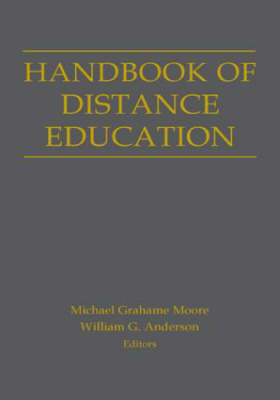
Handbook of Distance Education
Routledge (Verlag)
978-0-8058-5591-3 (ISBN)
- Titel ist leider vergriffen;
keine Neuauflage - Artikel merken
The volume provides a broad review of the research, complemented by commentaries based on practical experience. It addresses such questions as how distance education is best practiced at the level of the teacher, as well as the administrator, and it examines the public policy implications of shifting a greater proportion of educational resources to this method. Finally, it looks at how the expansion of distance education affects educational research and theory.
The Handbook has been recognized by the University Continuing Education Association's Distance Learning Community of Practice as the "Outstanding Book of 2003." Announcing the award, Elizabeth Houdek, Chair of the Awards committee wrote: "The Handbook has both breadth and depth and brings together the best thinking of the most noted practitioners in distance education and framed their contributions in an inspired format and structure."
Contents: Preface. Part I: Historical and Conceptual Foundations. F. Saba, Distance Education Theory, Methodology, and Epistemology: A Pragmatic Paradigm. V.V. Pittman, Correspondence Study in the American University: A Second Historiographic Perspective. C.E. Feasley, Evolution of National and Regional Organizations. E.L. Bunker, The History of Distance Education Through the Eyes of the International Council for Distance Education. D.E. Hanna, Organizational Models in Higher Education, Past and Future. B. Holmberg, A Theory of Distance Education Based on Empathy. O. Peters, Learning With New Media in Distance Education. D.R. Garrison, T. Anderson, W. Archer, A Theory of Critical Inquiry in Online Distance Education. T. Anderson, Modes of Interaction in Distance Education: Recent Developments and Research Questions. Part II: Learning and Learners. C.C. Gibson, Learners and Learning: The Need for Theory. D.R. Garrison, Self-Directed Learning and Distance Education. D. Granger, M. Bowman, Constructing Knowledge at a Distance: The Learner in Context. R.F. Curry, Academic Advising in Distance Education Degree Programs. D.J. Winiecki, Instructional Discussions in Online Education: Practical and Research-Oriented Perspectives. K. Carabajal, D. LaPointe, C.N. Gunawardena, Group Development in Online Learning Communities. C. Dillon, B. Greene, Learner Differences in Distance Learning: Finding Differences That Matter. M. Hannafin, J.R. Hill, K. Oliver, E. Glazer, P. Sharma, Cognitive and Learning Factors in Web-Based Distance Learning Environments. C. Kramarae, Gender Equity Online, When There Is No Door to Knock On. Part III: Design and Instruction. R. Shearer, Instructional Design in Distance Education: An Overview. D.J. Davis, Developing Text for Web-Based Instruction. A.G. Chute, From Teletraining to e-Learning and Knowledge Management. R.A. Wisher, C.K. Curnow, Video-Based Instruction in Distance Learning: From Motion Pictures to the Internet. C.J. Bonk, V. Dennen, Frameworks for Research, Design, Benchmarks, Training, and Pedagogy in Web-Based Distance Education. S. Naidu, Designing Instruction for e-Learning Environments. R.H. Hall, S.E. Watkins, V.M. Eller, A Model of Web-Based Design for Learning. S. McKnight, Distance Education and the Role of Academic Libraries. M. Sammons, Exploring the New Conception of Teaching and Learning in Distance Education. Part IV: Policies, Administration, and Management. L. Pacey, E. Keough, Public Policy, Institutional Structures, and Strategic Implementation. M. Simonson, T. Bauck, Distance Education Policy Issues: Statewide Perspectives. A.K. Lezberg, Accreditation: Quality Control in Higher Distance Education. A.C. Sherry, Quality and Its Measurement in Distance Education. P.J. Dirr, Distance Education Policy Issues: Towards 2010. T.A. Lipinski, Legal Issues in the Development and Use of Copyrighted Material in Web-Based Distance Education. R. Watkins, R. Kaufman, Strategic Planning for Distance Education. M.F. Beaudoin, Distance Education Leadership: An Appraisal of Research and Practice. A. Woudstra, M. Adria, Issues in Organizing for the New Network and Virtual Forms of Distance Education. L.L. Wolcott, Dynamics of Faculty Participation in Distance Education: Motivations, Incentives, and Rewards. M.M. Thompson, M.E. Irele, Evaluating Distance Education Programs. Part V: Different Audiences in Distance Education. D.G. Oblinger, S.C. Rush, The Involvement of Corporations in Distance Education. Z.L. Berge, Planning and Managing Distance Training and Education in the Corporate Sector. K. Perdue, Web-Based Continuing Professional Education: Uses, Motivations, and Deterrents to Participation. P.J.L. Westfall, Distance Education in the U.S. Air Force. S.M. Jones, L.A. Blevins, W. Mally, J.E. Munroe, The U.S. Marine Corps Distance Learning Program. M.W. Freeman, Distance Learning in the U.S. Army: Meeting the Readiness Needs of Transformation. C. Dalziel, Community Colleges and Distance Education. T. Clark, Virtual and Distance Education in American Schools. Part VI: The Economics of Distance Education. G. Rumble, Modeling the Costs and Economics of Distance Education. I. Jung, Cost-Effectiveness of Online Education. A. Inglis, A Comparison of Online Delivery Costs With Some Alternative Distance Delivery Methods. Part VII: International Perspectives. R. Mason, Global Education: Out of the Ivory Tower. C.N. Gunawardena, P.L. Wilson, A.C. Nolla, Culture and Online Education. T. Evans, D. Nation, Globalization and the Reinvention of Distance Education. J. Visser, Distance Education in the Perspective of Global Issues and Concerns. J. Daniel, W. Mackintosh, Leading ODL Futures in the Eternal Triangle: The Mega-University Response to the Greatest Moral Challenge of Our Age. M. Foley, The Global Development Learning Network: A World Bank Initiative in Distance Learning for Development.
| Erscheint lt. Verlag | 26.1.2005 |
|---|---|
| Verlagsort | New York |
| Sprache | englisch |
| Maße | 178 x 254 mm |
| Gewicht | 1520 g |
| Themenwelt | Schulbuch / Wörterbuch ► Unterrichtsvorbereitung ► Unterrichts-Handreichungen |
| Sozialwissenschaften ► Pädagogik | |
| Wirtschaft ► Betriebswirtschaft / Management ► Personalwesen | |
| ISBN-10 | 0-8058-5591-2 / 0805855912 |
| ISBN-13 | 978-0-8058-5591-3 / 9780805855913 |
| Zustand | Neuware |
| Haben Sie eine Frage zum Produkt? |
aus dem Bereich


